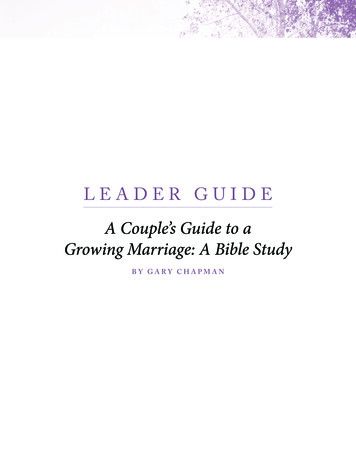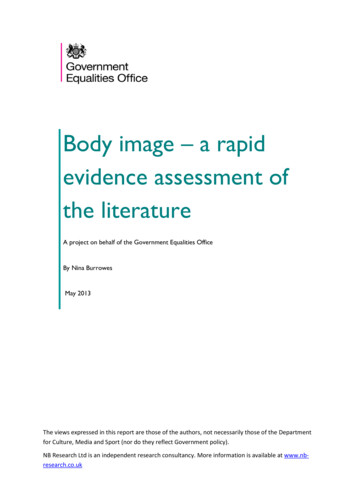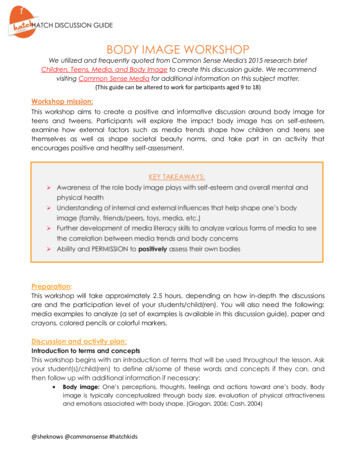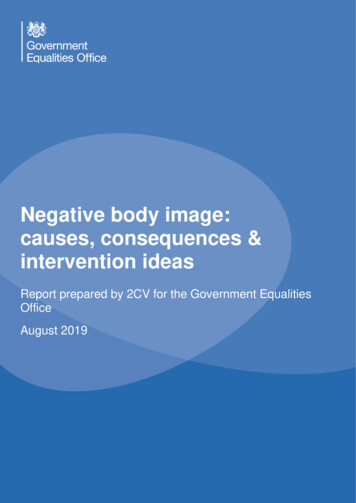
Transcription
LEADER GUIDEA Couple’s Guide to aGrowing Marriage: A Bible StudyBY GARY CHAPMAN
2006, 2010, 2016 by Gary D. ChapmanA Couple’s Guide to a Growing Marriage: A Bible Study (Leader Guide) is the companion guide to A Couple’s Guide to aGrowing Marriage: A Bible Study, which was previously published as Building Relationships: A Discipleship Guide forMarried Couples, 1995 Gary Chapman, Lifeway Press.All rights reserved. No part of this guide may be reproduced in any form without permission in writing from thepublisher, except in the case of brief quotations embodied in critical articles or reviews.All Scripture quotations, unless otherwise indicated, are taken from the Holy Bible, New International Version, NIV. Copyright 1973, 1978, 1984 by Biblica, Inc. Used by permission of Zondervan. All rights reservedworldwide.Scripture quotations marked kjv are taken from the King James Version.2
Table of ContentsSESSION 1:Introduction8SESSION 2:Enhancing my Conversation with God11SESSION 3:Enhancing my Conversation with my Spouse14SESSION 4:Learning to Forgive17SESSION 5:Developing my Serve20SESSION 6:Becoming Friends with my Feelings23SESSION 7:Learning to Listen27SESSION 8:Learning to Love29SESSION 9:Learning to Agree32SESSION 10:Developing a Positive Response to Anger35SESSION 11:Learning the Ministry of Intercession38SESSION 12:Making Money an Asset to Marriage41SESSION 13:Developing Mutual Sexual Fulfillment443
Leader GuideWelcome to the leadership family Some of you may have completed the of A Couple’sGuide to a Growing Marriage: A Bible Study. You and your spouse are joining a growingnumber of Christian couples who are concerned about the spiritual and marital climate withinthe church today. Do not count yourselves among those who waste time decrying the low levelof spiritual commitment and the weak, empty marriages of many Christian couples. Rather,commit to doing something to strengthen marriages.My wife, Karolyn, and I want our relationship with Christ to be dynamic, and we desireto see similar growth in other marriages. We have found help in this guide, and we see it as atool to stimulate growth in other couples. We desire that for you.Some of you may have completed the guide. You recognize that the lead couple do notneed to be perfect Christians or have a perfect marriage. The lead couple is a growing couplewho encourages group members to complete assignments and creates a climate for groupsharing. Couples learn much from each other as they share their strengths and weaknesses.Others of you will be innovators, the first in your church to lead this study. This LeaderGuide is written with you in mind. If you have a sincere desire for growth in your life andmarriage, a genuine concern for other couples, and some basic abilities in leading groupdiscussions, you have the qualities of a good leader for this guide.WHERE DO WE BEGIN?As a lead couple, become familiar with the Bible Study. Pages 7–10 provide a clear statementof the objectives and the methods of reaching these objectives. The table of contents providesa picture of the areas of growth you and the other couples in your group will explore. Scaneach chapter to get an idea of how each subject is treated.4
Note that each week’s basic format includes: Opening Activity Bible Study Learning Exercise Scripture Memory Daily Conversation with God Sharing Time with My SpouseIf you and your spouse are innovators, you will want to complete assignments at least oneweek ahead of the group so you can prepare the group for assignments. This will be especiallyimportant during the first few weeks as you and other couples establish a routine.Chapters 1 and 2 are foundational. They introduce activities that will continue dailythroughout the study. Chapter 1 gives instruction on how to have a daily conversation withGod, sometimes called a quiet time. This regular conversation with God will help you get toknow Him better. Chapter 2 introduces a daily sharing time with your spouse for the purposeof getting to know him or her better. The hope is that couples will find these two dailyexperiences so meaningful that they will continue them after they complete A Couple’s Guide toa Growing Marriage: A Bible Study.GodHOW MANY COUPLES?A good-sized group consists of 5 to 6 couples, plus the lead couple, for a total of 12 to 14people. Larger groups do not allow everyone to participate in the group sharing each week.Smaller groups can function well but may lose some benefits of group interaction.HOW MANY SESSIONS?H OW LONG IS EACH SESSI ON?A Couple’s Guide to a Growing Marriage: A Bible Study is a 13-week study. The first session isan introductory, get-acquainted time. Books are given out at this session, and the assignmentsfor the first week are explained. Each person needs to have a copy of the member book. The5forgivesus basedon whatChrist didfor us onthe cross.
second group session will focus on the material covered in chapter 1, which the group willhave completed the week prior to the meeting. Each week thereafter, the group will discussthe material they have completed during the previous week. The weekly group meeting shouldlast 1 to 1.5 hours. Some groups prefer Sundays; others find it better to meet on weeknights inhomes or at the church. Either setting is fine. Determine your meeting time before you recruitcouples.HOW DO WE RECRUIT COUPLES?The most effective means of getting couples committed to the study is through a face-to-faceinvitation. The lead couple should talk personally with each couple, explain the purpose of thestudy, and invite them to be members of the group. If you are an innovator or lead couple, youmay want to select the first five or six couples based on their leadership potential. Ideally, afterthey complete the study, some of them will lead additional groups. This is an effective way tobroaden your leadership base.The firstand greatestresponsibilityof the leadcouple is topray.HOW DOES THIS GUIDER E L AT E T O M Y C H U R C H ?This study will help participants build spiritual disciplines that stimulate Christian growth. Itis also a vehicle for helping the church foster strong, growing marriages. These two goals are atthe center of the church’s task to “make disciples of all nations” (Matthew 28:19).In some churches, a staff leadership couple may lead the first group. In other churches, thepastor may recruit a key lay couple to lead this ministry. In each case, the study needs to beunder the general supervision of the pastor, God’s appointed shepherd.W H AT A R E T H E R E S P O N S I B I L I T I E SOF THE LEAD COUPLE?The first and greatest responsibility of the lead couple is to pray. Pray before you recruitcouples. Pray as you visit and challenge couples to join you in this study. Pray after the groupis formed, and pray throughout the 13 weeks of the study. Pray that God will use this guide tostimulate genuine, lasting growth in the lives of the couples involved, including you and yourspouse.A second responsibility of the lead couple is to guide the weekly group sessions. Thesemeetings are to be sharing times in which each group member participates. The sharing will6
focus on the Bible study, Scripture memory, learning exercise, conversations with God, andsharing times with a spouse, which the couples have experienced during the week. This leaderguide will give you ideas for varying the format week by week.Leading the weekly group session is a shared responsibility of the lead husband and wife.Determine the most comfortable way of doing this. One way is for the husband to lead onesegment of the session and the wife to lead another segment. The leader guide organizes thesession into clear segments, which makes this method easy to follow. The leader guide doesnot, however, indicate who should do what. This is for you to decide. You will need to planahead each week and agree on what each of you will do.Create a climate where genuine sharing can take place. This is best done as the lead couplesets the example. If you are open about your response to the assignments of this guide, thegroup will likely share freely also. Remember to share failures as well as successes. Groupmembers might become discouraged if they think you are perfect.The lead couple must not be viewed as having all the answers. When the questions are raisedby group members, ask others in the group to contribute with questions such as “How dosome of you feel about that?” Commend them for their answers with comments: “That’s good;I like that!” Your affirmation encourages group participation.Some couples may need special encouragement. If you recognize that a couple is havingproblems with a particular part of the study, call or visit them during the week and offeradditional help. If couples are absent from the session, call them as soon as possible to find outwhether there is a problem. If couples must miss one of the weekly sessions, encourage themto discuss the material with each other and to keep up with assignments.Finally, the lead couple needs to be open to God’s leadership in identifying and encouragingcouples in the group who have potential for becoming leaders of these groups. Your churchneeds a number of leaders so that every couple desiring growth may have the experience ofbuilding the marriage they’ve always wanted.May God bless you as you embark on this ministry of discipleship to married couples.—Gary Chapman7
SESSION 1:SINTRODUCTIONession 1 is an introduction to A Couple’s Guide to a Growing Marriage: A Bible Study. Thissession is a time for getting acquainted and sharing what the couples can expect in thisstudy. This session would be planned for one hour. Couples who come to this first sessionwill not have their materials. Be prepared to provide each person a copy of the member book.Determine ahead of time if couples need to purchase these or if the church will provide them.As leaders, you will need to complete chapter 1 in the book before reading the followinginformation.As leaders, you will want to read our suggestions each week, and then develop your ownteaching plan. You will not need to refer to the leader guide during the session, only to yournotes. These notes may be written on a separate sheet, in the margins of the member book,or in the “Planning Notes” section for each session. We encourage you to be flexible and planeach session with your members’ needs in mind.1. Begin the group session by asking: “What difficulties did you experience in getting tothis meeting tonight? When we decide to do something good, often we experiencedifficulties in carrying it out. Let’s share some of the difficulties.”Allow each group member to share informally any frustrations they had in getting tothe meeting. Create a relaxed atmosphere and encourage interaction.2. Provide paper and pencils to each group member. Suggest that all group membersshare aloud the following information: (a) name, (b) birthplace, (c) number ofbrothers and sisters, (d) what you enjoyed doing as a child, (e) number of children(if any) and their names and ages. You might want to list these on newsprint or adry-erase board. Encourage group members to take notes as each member sharesbiographical information with the group. A first step in the sharing of our lives isproviding basic information such as this.3. Ask group members to tell the group why they chose to be part of this study.Encourage group members to share on a personal level why they made a decision tobe a part of the study.4. As the lead couple, give an overview of the guide, defining it as a personal growthstudy designed to help us grow in our relationship with God and in our relationshipwith our spouse.8
“In our relationship with God, this study emphasizes such basic growth methods asthe daily personal quiet time, a weekly Bible study, memorizing key Scripture verses(6 verses during the 13 weeks), and regular prayer. Throughout the study, you will findan emphasis in these four areas.”“In building a relationship with our spouse, the study emphasizes a daily 10–15minute sharing time. The Bible studies we will work through deal with variousprinciples related to marriage. We will memorize verses that relate to marriage.We will share learning exercises with each other. All of these will assist us instrengthening our marriage relationships.”“A Couple’s Guide to a Growing Marriage: A Bible Study requires private time andsharing time. In our private times, we will complete weekly assignments. In oursharing times, we will tell each other some of what we have been learning throughthe week.”5. Distribute a member book to each person. Ask them to look at the contents page.The chapter headings give an idea of basic subject areas they will cover each week.Have the group look at the Bible study in chapter 1. Suggest that it will probably takeabout an hour to complete the Bible study and learning exercise. Do not take time tolook at specific questions. This will be done next week after the group has completedthe Bible study.Throughout thestudy,we willwork to create anhonest atmospherewhere we canshare openly witheach other.6. Ask group members to close their member books. As lead couple, share the basicconcept of a personal quiet time. Explain that a conversation with God is twoway: God talks and I respond to what He says; I talk and God responds to whatI say. Emphasize that a quiet time is not simply reading the Bible and praying. Aconversation with God is listening to God speak through the Bible and respondingto what God is saying. Share the plan of reading one chapter per day, marking thoseideas that stand out in the chapter, and talking with God about the things you havemarked. Show members a chapter in your Bible as an example. Share with them yourconversation with God this morning. Emphasize that although many of them mayalready have a quiet time, during this study, we suggest that they follow this method.Discourage the use of devotional guides during this study. Encourage reading onechapter in the Bible each day, choosing a book and working through that book untilit is completed. Group members need not read the same book in the Bible. If you areasked to make a suggestion of a book to use, the Gospel of John, one of Paul’s letters,Psalms, or Proverbs are good. Next week, and each week that follows, group memberswill have an opportunity to share something they read in their quiet time during the9Encouragegroupmembersto share ona personallevel whythey madea decisionto be apart of thestudy.
past week. A form is provided on page 150 for members to record the chapter theyhave read each day.7. Emphasize that throughout the study we will work to create an honest atmospherewhere we can share openly with each other any difficulties we may have in ourpersonal quiet times with God. We want to be honest about difficulties we encounterand questions we may have in establishing this daily conversation with God.8. Allow time for questions and comments by the group. Close with prayer. As the leadcouple, you may wish to pray, or ask if any couple would like to lead in prayer.PLANNING NOTES10
SESSION 2:ENHANCING MYC O N V E R S AT I O Nwith G O DIn session 2, you will be discussing the material in chapter 1 of the Bible study. Assume thatgroup members have completed chapter 1 since your first meeting. Group members need torecognize the importance of completing home assignments. From the beginning, hold up theideal. The group experience will not be as effective if group members sense that the homeworkis not important. Also, and most important, couples will not grow as a result of the study.You do notOP ENI NG ACT IVI T YBegin by saying: “As you know, this week we have started developing a personal time withGod each day. We have read and marked one chapter in the Bible. We talked with God aboutwhat we have marked. Let’s begin our session by choosing one idea that you have marked inthe Bible this week and sharing it with someone in the group. I would like for the men toshare with another man and the women to share with another woman. You have one minuteto select the verse you would like to share; then read it to the other person and tell him or herwhy you marked it. That is, what impressed you about this verse?”After this exercise, allow individuals to share with the total group any difficulties they haveencountered this week in their quiet time.BIBLE ST UDYThis week, the Bible study was geared to help us discover the value of getting to know Godthrough the Scriptures. Work through the Bible study as a group. As you do, allow differentgroup members to share their answers. On some questions, you may ask several to share theiranswers; on other questions, you may simply call for one answer. Question 3 will give thegroup the opportunity to share their salvation testimonies with each other. This will give you11have to beperfect inorder to beof help tothe group.
an idea of the spiritual background of group members. If you discover as you listen that somedo not have a clear salvation testimony, you will want to pray for them. In the weeks ahead,take the opportunity to meet with them and lead them to assurance of salvation.Particularly focus on item 9. Share your personal testimony of memorizing Scripture. We willmemorize only six verses throughout the study, but they are practical verses. Urge members todevelop the habit of Scripture memory.On question 10, encourage group members to share but do not force anyone to do so. It is,however, in the sharing of personal matters that we will help each other most. Indicate thatthroughout the study, there will be an opportunity to check when you have completed certainassignments. This is to encourage us to complete the assignment rather than gloss over it.LEARNING EXERCISEAllow each group member to report at least one item listed under My Relationship with Godor My Relationship with My Spouse. As members share answers to this exercise, they willhelp each other establish goals for the next three months. Encourage group members to takenotes as they listen to others.LOOKING AHEADShare with the group before you leave that this coming week each person will beginestablishing a personal sharing time with his or her spouse. Just as we will have a personaltime with God, we will also have a daily sharing time with our spouse to get to know eachother better. Urge members to complete the Bible study and learning exercise early in theweek so that they may practice the sharing time as many days as possible. Note also that onpage 150, there is a form for them to record the book and chapter they have read and markedeach day in their conversation with God. Close the session with a brief prayer. Ask God tohelp group members accomplish the goals listed in this past week’s learning exercise.12
PLANNING NOTES13
SESSION 3:ENHANCING MYC O N V E R S AT I O Nwith M Y S P O U S ESession 3 is a discussion of the material in chapter 2. Members will have completed chapter 2of the Bible study the week prior to the meeting.OP ENI NG ACT IVI T YBegin this session by allowing each member to share with their spouse one verse they read andmarked in their Bibles during their conversation with God. Spend a few moments discussingany difficulties that group members are having with their personal quiet times. Be sympatheticwith any difficulties. Ask group members for suggestions to help others.LEARNING EXERCISEShare briefly with each other your success or lack of success with the learning exercise thisweek. The basic idea was to share three things that happened in your life each day and howyou felt about those three things. As the lead couple, begin with your own report of whathappened this week in your sharing times. Be honest about the number of days you and yourspouse had the sharing time. You do not have to be perfect in order to be of help to the group.Your honesty and openness will encourage the group to be honest and open. Very few of thegroup will have had a sharing time every day during the week; many will have had it only onceor twice. This is fine; we have plenty of time to establish this pattern. After several coupleshave shared successes or failures, emphasize the importance of following the suggested patternin the learning exercise: share three things that happened in my life today and how I feelabout them. Encourage everyone to use this format during the study, even though couplesmarried for some time may say, “Well, we talk; we have a sharing time; we are just not usingthis format.” Couples commonly share events but not feelings. The learning exercise willencourage couples to begin to share feelings and come to gain freedom in sharing emotions.14
As we share events and emotions we become more intimate.BIBLE ST UDYWork through the Bible study in chapter 2. Brief but clear answers to the first four questionswill be adequate. Emphasize the necessity of communication.Questions 5 and 6 are application questions. Several members in the group should have theopportunity to share answers. As they reveal common hindrances to open communication, youwill find couples gaining encouragement from each other. Several members may want to shareexamples of times when they have not spoken clearly and miscommunication has resulted.This will help the group see the common problems of miscommunication in a marriage.Question 6 grows out of the concept of James 5:12. Allowing members of the group to shareillustrations will help clarify the principle for other group members.Question 8 emphasizes the value of listening carefully and hearing our spouse before we givean answer. Group members may wish to share ways they have discovered that ensure mutualunderstanding. We will have additional material in chapter 6 on listening to emphasizereflective listening and some of the common techniques for developing understanding. Assurethe group that throughout the sessions, we will work to enhance communication; the basicbuilding block will be our daily sharing times. As a beginning point for communication, wewill share with our spouse three events in our day and how we felt about those events. Beyondthat, we may feel free to communicate anything else we would like, but this will be thefoundation of our sharing times. Our objective is to make this a daily part of our relationships.You may need to discuss briefly hindrances group members anticipate in accomplishing thisobjective. Offer appropriate suggestions. For example, couples apart because of vocations maycomplete some of their sharing times by phone or e-mail.SCRIP TURE MEMORYAllow husbands and wives to quote Ephesians 4:32 to each other. If they have not memorizedthe verse fully, encourage them to concentrate on memorizing it this week so that next weekthey can share it with the group.LOOKING AHEADDraw the group’s attention to page 150, where they will find a chart for recording the booksand chapters they are reading from the Bible each day. Suggest that they write in week 115You willfind couplesgainingencouragementfrom eachother
the material they recorded on page 14, and to write in week 2 the book and chapters theyrecorded on page 27. The book and chapters they read this week will be written in week 3.Draw attention to page 152 where members will record their daily sharing times with theirspouse. Again, week 1 will be blank and week 2 will contain the checks they have alreadywritten on page 27. The sharing times they have this week will be recorded under week 3.The purpose of the forms is to provide a record of our successes and to encourage us to makeour conversation with God and with our spouse a consistent part of our daily lives. This is anexercise in personal accountability. Encourage the group to complete the Bible study materialfor chapter 3 early in the week and to seek consistency in daily quiet time with God anddaily sharing time with their spouse. Close the session with a brief prayer time. Ask for God’sdirection in our lives as we seek to continue to grow in our relationship with Him, with ourspouse, and with each other.PLANNING NOTES16
SESSION 4:LEARNINGto F O R G I V ESession 4 is a discussion of the material in chapter 3. The group will have completed chapter 3the week prior to the meeting. Our topic is forgiveness.OP ENI NG ACT IVI T YBegin this session by focusing on Scripture memory. Ask husbands and wives to quoteEphesians 4:32 to each other. Ask for a volunteer to quote the verse to the entire group. Don’tforce any particular group member to do this; whoever shares will set the pace for others.Those who have not memorized the verse should be encouraged to concentrate genuinely onmemorizing it this week. The objective is to review the verse daily so that the principles foundin the verse will become a part of our lives.D A I LY C O N V E R S AT I O N W I T H G O DAsk group members to turn to page 150 and share with their spouse the record of theirpersonal quiet times. As they show each other this form, they should also report on theirprogress. The husband may say to his wife, “I did pretty well this week; I had a quiet timefor four days out of the seven,” or “I really haven’t gotten into the swing of this yet, but nextweek will be different.” This brief time of accountability will encourage consistency during thecoming weeks.D A I LY S H A R I N G T I M E W I T H M Y S P O U S EHave the group turn to page 152 and repeat the process as they talk about their sharing times.If they are not being consistent, take a moment to discuss what changes they need to makeso that they can have these sharing times. At this stage, participants need to recognize thevalue of the daily quiet time with God and the daily sharing time with their spouse. There is17
nothing more fundamental to spiritual and marital growth than these two disciplines.TheBIBLE ST UDYof askingIf time permits, walk through each of the Bible study questions, receiving brief answers fromone person on the factual questions and letting several members share on discussion questions.experienceGod to helpus list ourfailures is avital exercisein maritalgrowth.In question 2, the word confess literally means “to agree with.” When we confess sin, it meansthat we agree with God that what we have done is wrong. Questions 5, 6, and 7 distinguishbetween forgiveness and forgetting. We know that God is omniscient; He knows all things.When God forgives us, it does not mean that He is no longer conscious of our sin. It means,however, that God chooses no longer to hold our sin against us. When we forgive others,it does not mean that we will never remember the wrong they have done; it means that wehave promised never to hold that wrong against them. Forgiveness is a promise, not a feeling.We have not failed when we remember a sin that we have forgiven. When feelings of hurt,disappointment, or anger come to mind over a sin we have forgiven, we should tell God whatwe are feeling and thank Him that it is now forgiven. We would pray, Father, You know whatI’m thinking and feeling, but I want to thank You that that sin is forgiven. Help me to dosomething positive today.In questions 10 and 11, the group will discover that when we sin against our spouse, we are togo to him or her, confess our sin, and ask forgiveness. When our spouse sins against us, we areto confront him or her lovingly (see Matthew 18:15).Questions 13 and 14 point out the responsibility we have to forgive others when they arewilling to confess their wrong.LEARNING EXERCISEAsk the group to turn to page 36 to see if they have recorded the date they completed thisexercise. Do not ask them to share this date with the group, but encourage those who perhapshave not completed this exercise to do so as soon as possible. The experience of asking Godto help us list our failures is a vital exercise in marital growth. Encourage every couple tocomplete the exercise. Assure couples that these lists will not be shared with the group; they18
are to be shared only with each other.LOOKING AHEADNext week, the topic is about learning to serve our spouse. One of the most importantprinciples in marriage is learning how to serve each other. Encourage the group to do theBible study early in the week and to complete the learning exercise. Challenge members toseek to be more consistent in daily conversations with God and in daily sharing times withtheir spouse. Remind them to record these on pages 150 and 152 this week. Close the sessionwith a prayer time. During this prayer, offer an opportunity for members to pray voluntarily.Do not putPLANNING NOTESpressure onevery groupmember toshare, butrecognizethose whoare open tosharing.19
SESSION 5DEVELOPINGmy S ERV ESession 5 is a discussion of the material in chapter 4. The group will have completed chapter 4the week prior to the meeting. Our topic focuses on learning to serve our spouse.OP ENI NG ACT IVI T YBegin the session by focusing on our conversation with God this week. Ask members to selecta verse they marked. Allow several members to share their verse with the group, why theymarked it, and what the verse means to them. Do not put pressure on every group memberto share, but recognize those who are open to sharing. You may wish to allow individuals toexpress difficulties they still have being consistent in this daily time of conversation with God.Allow group members to encourage each other.SCRIP TURE MEMORYThis week, the group began memorizing 1 John 1:9. Since this may be a familiar verse,many group members will find it easy to memorize. You may wish to ask for a volunteer totry quoting 1 John 1:9 for the group. Then have two or three members quote for the groupEphesians 4:32. The experience of quoting the verse in front of the group will strengthen theone who is quoting and encourage others to review Scripture verses consistently. We will haveanother week of review on these verses. By next week, everyone should be able to quote botho
Pray before you recruit couples. Pray as you visit and challenge couples to join you in this study. Pray after the group is formed, and pray throughout the 13 weeks of the study. Pray that God will use this guide to stimulate genuine, lasting growth in the lives of the couples










